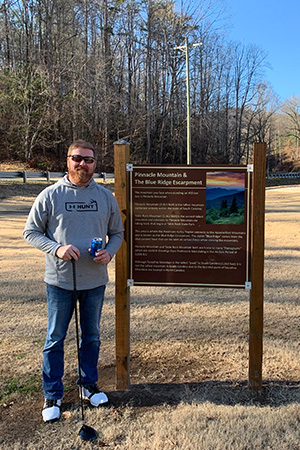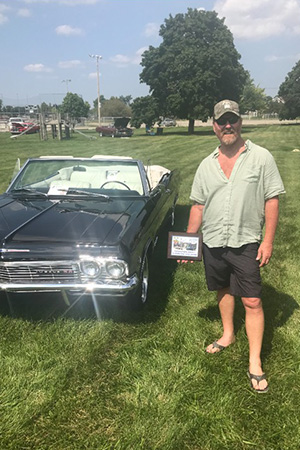George’s Story
Powered by perseverance: George’s journey with peritoneal mesothelioma
 For George Susewitz of Huron Township, life was all about working hard and enjoying simple pleasures. A proud construction professional who learned the trade from his father, George spent decades in the industry before retiring. Off the clock, he loves fishing, golfing and restoring classic muscle cars from the 1960s — all while being a devoted husband, father of two and grandfather of five.
For George Susewitz of Huron Township, life was all about working hard and enjoying simple pleasures. A proud construction professional who learned the trade from his father, George spent decades in the industry before retiring. Off the clock, he loves fishing, golfing and restoring classic muscle cars from the 1960s — all while being a devoted husband, father of two and grandfather of five.
But in 2019, George’s life took a sudden and frightening detour.
It started with abdominal swelling
George, who resides in Huron Township, recalls feeling bloated with abdominal swelling that would not go away. It prompted him to go to the doctor, who confirmed he had fluid buildup in his stomach. “When the doctor removed the fluid and it returned, I was told the fluid did not look good.” As George and his family were trying to take in the gravity of his situation, the news got worse. “The gastroenterologist said to me, ‘I know this is going to blow you away, but you have cancer, likely appendix or peritoneal, which is extremely rare, affecting as few as one in a million people.” George was then given a sliver of hope in finding the best practitioner with experience in treating the rare diagnosis. “The doctor said I want to get you to one of the best in the country to treat you, Dr. Richard Berri.” After going home and researching specialists and treatment options throughout the country, George felt confident in the doctor’s recommendation.
Hope with HIPEC
 George remembers the meeting with the gastroenterologist was on a Thursday and by the following Monday, he was already in touch with Dr. Berri, chief of surgical oncology and director of the Hyperthermic Intraperitoneal Chemotherapy (HIPEC) Program at Henry Ford St. John Hospital.
George remembers the meeting with the gastroenterologist was on a Thursday and by the following Monday, he was already in touch with Dr. Berri, chief of surgical oncology and director of the Hyperthermic Intraperitoneal Chemotherapy (HIPEC) Program at Henry Ford St. John Hospital.
After consulting with Dr. Berri, further testing confirmed George had stage 4 peritoneal mesothelioma, a rare cancer that develops in the peritoneum, the lining of the abdominal cavity.
George expressed that before meeting Dr. Berri, he and his family were a mess, with little hope for long-term survival. “Dr. Berri and his team gave me renewed hope. He was confident and compassionate at the same time, as he described the best course of treatment would entail HIPEC.”
Dr. Berri, who specializes in the surgical management of peritoneal cancer, explains HIPEC is a surgical procedure involving removing visible tumors and then bathing the abdominal cavity with heated chemotherapy drugs for approximately 90 minutes to kill any remaining cancer cells. He explains that this treatment option is associated with longer survival times and better quality of life for many patients.
“The goal of the operation for patients like George is to physically remove all of the tumor that has spread into the abdominal cavity, including different organs within the abdominal cavity. The heated chemotherapy is then applied to treat the microscopic disease that we cannot see during the tumor removal,” he says. Dr. Berri, who developed the program at Henry Ford St. John Hospital into one of the leading HIPEC programs in the United States, has treated approximately 600 patients with HIPEC. He says in the past treatments for patients like George were quite limited. “Prior to HIPEC, patients with these findings would be offered, sometimes no treatment at all, or they would be offered some type of chemotherapy in the form of a pill or through the vein, but those therapies were not very effective at helping patients treat these types of tumors and in most cases had a survival of approximately six months after an operation. We are one of the only centers in the country that has published data on outcomes and our program shows an average five-year survival of 80.3 percent for peritoneal mesothelioma after HIPEC so this is a dramatic improvement over previous therapies.”
What the treatment has meant to George
George, who undergoes systemic chemotherapy with Zyad Kafri, M.D. to target remaining cancer cells and prevent recurrence as part of his treatment plan at Henry Ford St. John says despite the stage 4 cancer diagnosis, other than retiring a little early from his job, he has been able to continue to focus on living life doing the things he loves to do.
“You can’t just sit around and do nothing,” he states. “My biggest complaint is a little congestion,” he notes. “I’ve gone golfing right after chemotherapy treatment and continue to fish and tinker with my muscle cars, all while looking forward to celebrating my 40th wedding anniversary with my wife Susan, this year. I can’t thank Dr. Berri, Dr. Kafri and the entire Henry Ford St. John team enough. There was never a time that I didn’t reach out to them where I felt my concerns were not addressed. The truth is I don’t believe I would be alive today if it weren’t for Dr. Berri and his team.”
For further information on effective treatment options for certain cancers that have spread to the lining of the abdomen, visit HIPEC Program at Henry Ford Health.
.svg?iar=0&hash=F6049510E33E4E6D8196C26CCC0A64A4)

/hfh-logo-main--white.svg?iar=0&hash=ED491CBFADFB7670FAE94559C98D7798)